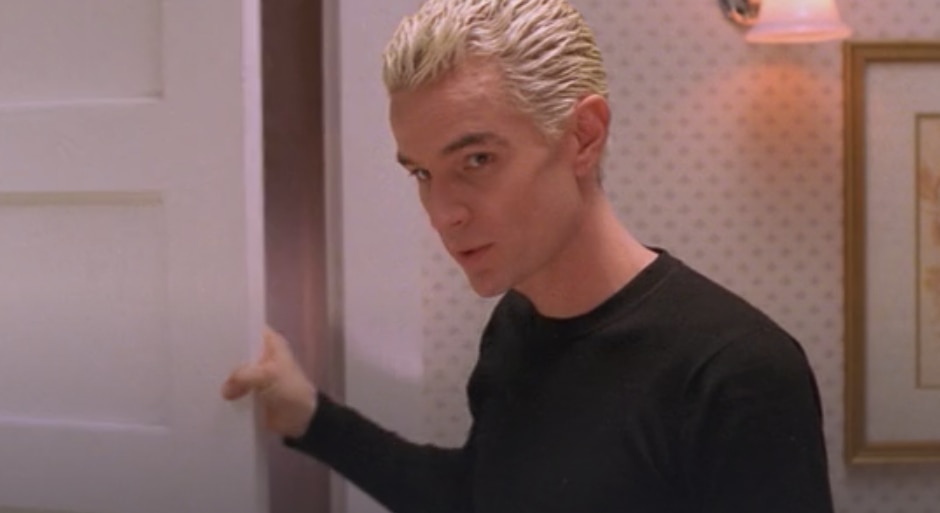Create a free profile to get unlimited access to exclusive videos, sweepstakes, and more!
Alright, let's talk about Spike, Buffy and that scene

One of the most brutal, controversial episodes of Buffy the Vampire Slayer, "Seeing Red," Episode 19 of Season 6, has managed to become even more so with age. The episode features two moments designed to make fans feel rage or sadness or loss, and instead steeped us all in two of the worst tropes in genre and beyond.
One, of course, is the trope of Bury Your Gays, with this episode culminating in Tara's infamous death at the hands of Warren Mears. The other lacks a succinct phrase to describe it but is also damaging and dangerous, with implications that echo across television and into real life, especially right now.
Content warning: this piece discusses rape and sexual assault, including a description of an attempted rape sequence.
Episodic television has a history of providing us the sympathetic rapist. From Julie's (Amy Jo Johnson) rape on Felicity at the hands of Zach (Devon Gummersall), an embarrassed virgin, to Jaime Lannister (Nikolaj Coster-Waldau) attempting to rape Cersei (Lena Headey) next to their son's dead body on Game of Thrones, a both-sides narrative is often constructed. The implication here is that within the show, and as such, within life, rape is explicable, understandable, and even up for debate. In many cases, it is the act of a desperate man just trying to get close to the woman he loves and lashing out. It's as though the show wants us to believe that, given how frustrated he is, he has no choice but to attack a woman. This is often as a rock-bottom moment leading to personal betterment. Because, as that man is a permanent fixture of the show, the writers want us to still love the character. This is the case with Jaime Lannister, and this is most definitely the case with Spike on Buffy.
In "Seeing Red," Spike goes to Buffy searching for forgiveness after having sex with Anya. Buffy is hurt and angry. She tells him she could never trust him enough to love him. He attempts to appeal to her, and when she says no (repeatedly) and pushes him away, he attacks.
The scene is long. Longer in feeling than in time, honestly, but still long, a full minute. Spike, almost calm and rational, quiet as though he's genuinely trying to reason with her, repeatedly pleads with an injured and therefore powered-down Buffy to let him love her, that he wants to "make her feel it." He knocks her down, bashing her already hurt back against the tub, pulling down the curtain. She cries and screams and claws at him to stop, to no avail until she manages to kick him across the room.
Spike, of course (because, again, it's a TV show and this is a beloved character that we as an audience are expected to love and continue to love), is horrified by his actions. This act sets him on a quest, of sorts, to retrieve his soul. The rapist finds redemption. Hoorah, I guess.
But while this scene is bad, it reverberates back through the season, showing us that what we thought was hot but toxic was actually deeply disturbing with implications reaching far beyond the narrative itself.
Because all of Buffy and Spike's sexual encounters featured one common thread: the word no.
Buffy and Spike's relationship was a pillar of Buffy's darker, post-death days, a sexual symbol of her self-destruction. She knew she shouldn't, but couldn't help herself. No always either meant yes, or could easily, wantonly, be turned into one.
In a world where the subject of consent is still somehow confusing for people, where it is itself a controversial concept, where the MeToo discussion is littered with victim-blaming while understanding and nuance are seemingly only allotted for the attacker, a season-long arc where the word "no" means nothing is appalling, in hindsight.
Our understanding of toxic masculinity, consent, gender dynamics, and rape culture have evolved significantly since 2002 when this episode first aired. But even with, especially with, shows and films we still love and still look to as important relevant, cultural touchstones, it's necessary to reexamine what we forgave and excused in the past. It's beyond Buffy. It's about all of us.


























